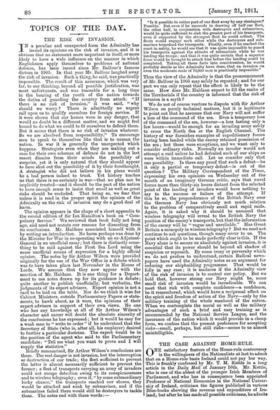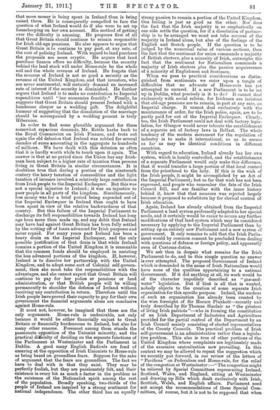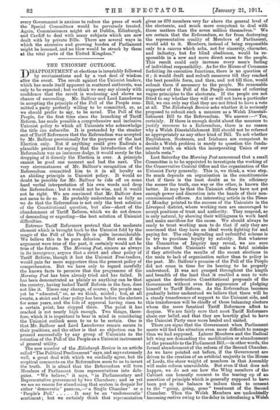THE CASE AGAINST HOME-RULE.
ONE satisfactory feature of the Home-rule controversy is the willingness of the Nationalists at last to admit that on a Home-rule basis Ireland could not pay her way. This is frankly confessed by Mr. T. M. Kettle in a long article in the Daily Mail of January 16th. Mr. Kettle, who is one of the ablest of the younger Irish Members of Parliament, and who has in consequence been appointed Professor of National Economics in the National Univer- sity of Ireland, criticises the figures published in various Blue-books showing the revenue and expenditure of Ire- land; but after he has made all possible criticisms, he admits that more money is being spent in Ireland than is being raised there. He is consequently compelled to face the question of what Ireland would do if she were to set up housekeeping on her own account. His method of getting over the difficulty is amusing. He proposes first of all that Great Britain should continue to remain responsible for Irish old-age pensions. He also appears to argue that Great Britain is to continue to pay part, at any rate, of the cost of policing Ireland. With regard to land purchase the proposals are more cryptic. He argues that land purchase finance offers no difficulty, because the security behind the land stock will under Home-rule be the whole soil and the whole revenue of Ireland. He forgets that the revenue of Ireland is not so good. a security as the revenue of the United Kingdom, and that investors, who are never sentimental, will certainly demand an increased rate of interest if the security is diminished. He further argues that Ireland is to make no contribution to Imperial expenditure until " her economies fructify." Finally, he suggests that Great Britain should present Ireland with a handsome cheque as a wedding gift. The delightful humour of suggesting that the dissolution of the marriage should be accompanied by a weddii g present is truly Hibernian.
In order to find some plausible argument for these somewhat rapacious demands, Mr. Kettle harks back to the Royal Commission on Irish Finance, and trots out again the old delusion that Ireland was robbed for several decades of sums amounting in the aggregate to hundreds of millions. We have dealt with this delusion so often that it is hardly worth while to touch upon it again. The answer is that at no period since the Union has any Irish- man been subject to a, higher rate of taxation than persons living in Great Britain in similar circumstances. It is doubtless true that during a portion of the nineteenth century the heavy taxation of commodities and the light taxation of incomes involved a relatively large contribution from Irish people to the Imperial Exchequer. But this was not a special injustice to Ireland ; it was an injustice to poor people in all parts of the kingdom. Simultaneously, less money was for a brief period being expended out of the Imperial Exchequer in Ireland than ought to have been spent in view of the relative backwardness of that country. But this failure of the Imperial Parliament to discharge its full responsibilities towards Ireland has long ago been more than made up, and any debit that Ireland may have had against Great Britain has been fully settled by the writing off of loans advanced for Irish purposes and never repaid. For many years past Ireland has been a heavy drain on the Imperial Exchequer, and the only possible justification of that drain is that while Ireland remains a portion of the United Kingdom it is reasonable that the common funds should be employed in assisting the less advanced portions of the kingdom. If, however, Ireland is to dissolve her partnership with the United Kingdom, and to adopt some sort of Colonial self-govern- ment, then she must take the responsibilities with the advantages, and she cannot expect that Great Britain will continue to pay for her police or pensions or land administration, or that British people will be willing permanently to shoulder the defence of Ireland without receiving any contribution in return. Therefore until the Irish people have proved their capacity to pay for their own government the financial arguments alone are conclusive against Home-rule.
It must not, however, be imagined that these are the only arguments. Home-rule is undesirable, not only because it would be either financially unjust to Great Britain or financially burdensome to Ireland, but also for many other reasons. Foremost among them stands the passionate opposition of the Unionist minority, and the practical difficulty of deciding on the separate functions of the Parliament at Westminster and the Parliament in Dublin. A good many English Radicals are fond of sneering at the opposition of Irish Unionists to Home-rule as being based on groundless fears. Suppose for the sake of argument that the fears are groundless. The fact we • have to deal with is that they exist. They may be perfectly foolish, but they are passionately felt, and their existence is every bit as much a factor in the problem as the existence of the Nationalist spirit among the rest of the population. Broadly speaking, two-thirds of the • people of Ireland are inspired by a strong sentiment for national independence. The other third has an equally strong passion to remain a portion of the United Kingdom. One feeling is just as good as the other. Nor does the fact that the Irish majority is so emphatically on one side settle the question, for if a dissolution of partner- ship is to be arranged we must not take account of the majority in Ireland alone, but also of the feelings of the English and Scotch people. If the question is to be judged by the numerical value of various sections, then the fact that the sentiment for union commands a majority of British electors, plus a minority of Irish, outweighs the fact that the sentiment for Nationalism commands a majority of Irish electors plus the passive acquiescence of a minority of Englishmen and Scotsmen.
When we pass to practical considerations as distin- guished from sentiments we enter upon a tangle of difficulties that no advocate of Home-rule has yet attempted to unravel. If a new Parliament is to be set up in Dublin, what precisely is it to do ? It cannot deal exclusively with social reform, for Irishmen are insistent that old-age pensions are to remain, in part at any rate, an Imperial charge. It cannot deal exclusively with the maintenance of order, for the Irish police, again, are to be partly paid for out of the Imperial Exchequer. Clearly, too, the Irish Parliament could not deal with factory legis- lation, for Glasgow would never tolerate the establishment of a separate set of factory laws in Belfast. The whole tendency of the modern movement for the regulation of industry is to make it international, so as to secure as far as may be identical conditions in different countries.
With regard to education, Ireland already has her own system, which is loeally controlled, and the establishment of a separate Parliament would only make this difference, that it would transfer a large portion of that local control from the priesthood to the laity. If this is the wish of the Irish people, it might be accomplished by an Act of the Imperial Parliament; but so far that wish has not been expressed, and people who remember the fate of the Irish Council Bill, and are familiar with the inner history behind it, know that that measure was rejected largely because it proposed to substitute lay for clerical control of Irish education.
Again, Ireland has already obtained from the Imperial Parliament a land system professedly adapted to her special needs, and it certainly would be easier to secure any further modifications of that land system which may be considered necessary by applying to the Imperial Parliament than by setting up an entirely new Parliament and a new system of government. It only remains to add. that the Irish Parlia- ment would by common consent be precluded from dealing with questions of defence or foreign policy, and apparently even of Customs-duties.
We ask then in despair what remains for the Irish Parliament to do, and to this simple question no answer is ever attempted. The proposed Government of Ireland which is demanded in the name of Irish Nationalism would have none of the qualities appertaining to a national Government. If it did anything at all, its work would be of the character impolitely described as " gas-and- water" legislation. But if that is all that is wanted, nobody objects to the creation of some separate Irish organisation for this specific purpose. Indeed, the nucleus of such an organisation has already been created by the wise foresight of Sir Horace Plunkett—recently and truly described by Sir Thomas Sinclair as " the greatest of living Irish patriots "—who in framing the constitution of an Irish Department of Industries and Agriculture provided for the partial control of the Department by an Irish Council mainly consisting of elected representatives of the County Councils. The practical problem of Irish self-government is an administrative rather than a legisla- tive problem. This also is true of other portions of the United Kingdom where complaints are legitimately made of the excessive centralisation now prevailing. In this context we may be allowed to repeat the suggestion which we recently put forward, in our review of the letters of " Pacificus " on Federalism and Home-rule, for the relief of the congestion at Westminster :—" The congestion might be relieved by Special Committees representing Ireland, Scotland, Wales, and England, sitting at Westminster and drawing up Bills which dealt exclusively with Irish, Scottish, Welsh, and English affairs. Parliament need. not accept the recommendations of .these Special Com- mittees, of course, but it is not to be supposed that when every Government is anxious to reduce the press of work the Special Committees would be perversely treated. Again, Commissioners might sit at Dublin, Edinburgh, and Cardiff to deal with many subjects which are now dealt with by private Bills. There are several ways in which the excessive and growing burden of Parliament might be lessened, and no blow would be struck by them at the vital parts of the United Kingdom."












































 Previous page
Previous page